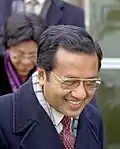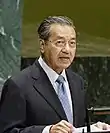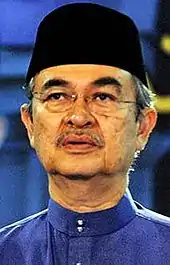Abdullah Ahmad Badawi
Abdullah bin Ahmad Badawi (Jawi: عبدالله بن أحمد بداوي; born 26 November 1939) is a Malaysian politician who served as the 5th Prime Minister of Malaysia from 2003 to 2009. He was also the President of the United Malays National Organisation (UMNO), the largest political party (that time) in Malaysia, and led the governing Barisan Nasional parliamentary coalition. He is informally known as Pak Lah, Pak meaning 'Uncle', while Lah is taken from his name 'Abdullah'. He is also referred to as the "Father of Human Capital Development" (Bapa Pembangunan Modal Insan).
Abdullah Ahmad Badawi | |
|---|---|
عبدالله أحمد بداوي | |
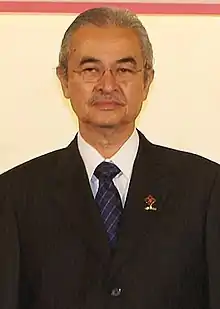 | |
| 5th Prime Minister of Malaysia | |
| In office 31 October 2003 – 3 April 2009 | |
| Monarch | |
| Deputy | Najib Razak |
| Preceded by | Mahathir Mohamad |
| Succeeded by | Najib Razak |
| Constituency | Kepala Batas |
| Minister of Defence | |
| In office 23 September 2008 – 9 April 2009 | |
| Monarch | Mizan Zainal Abidin |
| Prime Minister | Himself |
| Deputy | Abu Seman Yusop |
| Preceded by | Najib Razak |
| Succeeded by | Ahmad Zahid Hamidi |
| Constituency | Kepala Batas |
| In office 11 August 1986 – 7 May 1987 | |
| Monarch | Iskandar |
| Prime Minister | Mahathir Mohamad |
| Deputy | Abang Abu Bakar Abang Mustapha |
| Preceded by | Mahathir Mohamad |
| Succeeded by | Tengku Ahmad Rithauddeen Tengku Ismail |
| Constituency | Kepala Batas |
| Minister of Finance | |
| In office 3 November 2003 – 23 September 2008 | |
| Monarch | |
| Prime Minister | Himself |
| Deputy |
|
| Preceded by | Mahathir Mohamad |
| Succeeded by | Najib Razak |
| Constituency | Kepala Batas |
| Minister of Internal Security | |
| In office 27 March 2004 – 17 March 2008 | |
| Monarch | |
| Prime Minister | Himself |
| Deputy |
|
| Preceded by | Himself as Minister of Home Affairs |
| Succeeded by | Syed Hamid Albar as Minister of Home Affairs |
| Constituency | Kepala Batas |
| Minister of Home Affairs | |
| In office 10 January 1999 – 26 March 2004 | |
| Monarch | |
| Prime Minister |
|
| Deputy |
|
| Preceded by | Mahathir Mohamad |
| Succeeded by |
|
| Constituency | Kepala Batas |
| 8th Deputy Prime Minister of Malaysia | |
| In office 29 January 1999 – 31 October 2003 | |
| Monarch | |
| Prime Minister | Mahathir Mohamad |
| Preceded by | Anwar Ibrahim |
| Succeeded by | Najib Razak |
| Constituency | Kepala Batas |
| Minister of Foreign Affairs | |
| In office 15 March 1991 – 10 January 1999 | |
| Monarch | |
| Prime Minister | Mahathir Mohamad |
| Deputy | Leo Michael Toyad |
| Preceded by | Abu Hassan Omar |
| Succeeded by | Syed Hamid Albar |
| Constituency | Kepala Batas |
| Minister of Education | |
| In office 17 July 1984 – 10 August 1986 | |
| Monarch | Azlan Shah |
| Prime Minister | Mahathir Mohamad |
| Deputy | Bujang Ulis |
| Preceded by | Sulaiman Daud |
| Succeeded by | Anwar Ibrahim |
| Constituency | Kepala Batas |
| Minister in the Prime Minister's Department | |
| In office 17 July 1981 – 17 July 1984 | |
| Monarch | |
| Prime Minister | Mahathir Mohamad |
| Deputy |
|
| Preceded by | Pengiran Othman Pengiran Rauf as Minister without Portfolio |
| Succeeded by | James Peter Ongkili |
| Constituency | Kepala Batas |
| 22nd Secretary General of Non-Aligned Movement | |
| In office 31 October 2003 – 15 September 2006 | |
| Preceded by | Mahathir Mohamad |
| Succeeded by | Fidel Castro |
| Member of the Malaysian Parliament for Kepala Batas | |
| In office 31 July 1978 – 5 May 2013 | |
| Preceded by | Mohamed Sopiee Sheikh Ibrahim |
| Succeeded by | Reezal Merican Naina Merican |
| Majority | 5,029 (1978) 12,644 (1982) 8,622 (1986) 9,851 (1990) 17,834 (1995) 11,175 (1999) 18,122 (2004) 11,246 (2008) |
| Personal details | |
| Born | Abdullah bin Ahmad Badawi 26 November 1939 Bayan Lepas, Penang, Straits Settlements (now Malaysia) |
| Political party | United Malays National Organisation |
| Other political affiliations | Barisan Nasional Muafakat Nasional Perikatan Nasional |
| Height | 1.65 m (5 ft 5 in) |
| Spouse(s) | |
| Relations | Khairy Jamaluddin (son in law) |
| Children | 4 (2 children and 2 stepchildren) |
| Education | BA in Islamic Studies |
| Alma mater | University of Malaya |
After Deputy Prime Minister Anwar Ibrahim was dismissed, Prime Minister Mahathir Mohamad appointed Abdullah as Deputy Prime Minister in 1999. Abdullah went on to succeed Mahathir as Prime Minister in 2003.
In the 2004 general election, Abdullah scored a significant victory. In the 2008 general election, Barisan Nasional won a slim majority of seats but lost its two-thirds majority and also lost 5 states to Opposition Pact. He stepped down in favour of his successor, Najib Razak, during the UMNO General Assembly held on 1 April 2009. On 3 April 2009, he was succeeded by Najib Razak as prime minister.[1] Abdullah was then conferred the title 'Tun' by King Mizan Zainal Abidin for his service to the nation.[2]
He was also a Member of Parliament for Kepala Batas for eight consecutive terms, that was from 1978 to 2013. Currently, he serves as the Chancellor of Universiti Teknologi Petronas (UTP).
Background and early life
Abdullah was born in Bayan Lepas, Penang to a prominent religious family. Badawi's paternal grandfather, Syeikh Abdullah Badawi Fahim, was of Hadrami descent.[3] Syeikh Abdullah was a well-respected religious leader and nationalist, was one of the founding members of Hizbul Muslimin, later known as PAS. After independence, Syeikh Abdullah became the first mufti of Penang after Independence.[4] His father, Ahmad Badawi, was a prominent religious figure and UMNO member. His mother, Kailan Haji Hassan died in Kuala Lumpur at the age of 80 on 2 February 2004.[5] His maternal grandfather, Ha Su-chiang (traditional Chinese: 哈蘇璋; simplified Chinese: 哈苏璋; pinyin: Hā Sūzhāng; Wade–Giles: Ha1 Su1-chang1) (also known as Hassan Salleh), was a Utsul Muslim who came from Sanya in Hainan.[6][7][8][9][10]
Abdullah is a former student of Bukit Mertajam High School. He studied at MBS (Methodist Boy's School) Penang for his 6th form. Abdullah obtained a Bachelor of Arts degree in Islamic Studies from the University of Malaya in 1964.[11]
Political career
After graduating from the University of Malaya, he joined the Malaysian Administrative and Diplomatic Corps (the formal term for the civil service). He served as Director of Youth at the Ministry of Youth and Sport as well as Secretary of the National Operations Council (MAGERAN). He resigned in 1978 to become the member of parliament for his constituency of Kepala Batas in northern Seberang Perai (which had also been represented by his father).
Early during Mahathir's tenure as prime minister, a bitter dispute erupted within the ruling UMNO party and it was divided into two camps, which were colloquially known as 'Team A', comprising Mahathir loyalists, and 'Team B', which supported former Minister of Finance Tengku Razaleigh Hamzah and former Deputy Prime Minister Musa Hitam. Mahathir prevailed, leading to the exclusion of Tengku Razaleigh Hamzah from the newly established UMNO (Baru) or New UMNO. Abdullah was a close supporter of his political mentor Musa Hitam in Team B and as a result, he was sacked from his post of Minister of Defence in the Cabinet. He did not join the Semangat 46 (Spirit 46) party which was set up by Tengku Razaleigh Hamzah. Semangat 46 is now defunct.
When UMNO (Baru) was formed in February 1988, Mahathir, the UMNO President and Prime Minister, brought Abdullah into the pro tem committee of UMNO (Baru) as the vice-president. In 1990, Abdullah retained his seat as vice-president. During the Cabinet reshuffle in 1991, Mahathir brought him back into the Cabinet as Foreign Minister. He held this post until November 1999, when Syed Hamid Albar succeeded him. Even though he lost his vice presidency in the 1993 UMNO elections, he remained in the Cabinet and was appointed Minister of Foreign Affairs. Prior to 1998, he also served as Minister in the Prime Minister's Department, Minister of Education, Minister of Defence, and Minister of Foreign Affairs. He completed his probation when he was appointed Deputy Prime Minister of Malaysia and Minister of Home Affairs following the dismissal of Anwar Ibrahim.
Premiership
First term
Upon coming into power as prime minister, Abdullah Badawi promised to clamp down on corruption, thus empowering anti-corruption agencies and providing more avenues for the public to expose corrupt practices. He also arrested several public figures from the Mahathir era for corruption, a move which was widely applauded by the public. He advocated an interpretation of Islam known as Islam Hadhari, which advocates the intercompatibility between Islam and economic and technological development. His administration emphasised a revival of the Malaysian agricultural sector.
In the 2004 general election, Abdullah Badawi's first as Prime Minister of Malaysia, he delivered a landslide victory for his party's coalition Barisan Nasional (of which UMNO is the dominant party) by winning 198 out of 220 seats in parliament and wresting control of the Terengganu state government from the Islamist opposition Pan-Malaysian Islamic Party (PAS), as well as coming close to capturing the traditional PAS stronghold of Kelantan. The victory was widely regarded as an approval of his vision of moderate Islam over religious fundamentalism as well as support for his anti-corruption policies.
Former Deputy Prime Minister Anwar Ibrahim, upon his release from prison in September 2004, publicly credited Abdullah Badawi for not interfering with the court's overturning of his sodomy conviction.
On 10 September 2004, Abdullah Badawi became as Finance Minister, presented his maiden budget, which was seen by many as maintenance-oriented as opposed to the growth policies emphasised by Dr. Mahathir. He also focused on Malaysia's internal security after the increase in corrupt practices, such as bribery, in the Law enforcement in Malaysia.
Abdullah Badawi is unofficially known as Pak Lah (Malay diminutive for 'Uncle Abdullah'). The Malaysian government issued a statement that the prime minister should not be referred to by this nickname in official articles and in newsprint; however, the nickname was still used informally. In fact, he often used that nickname to refer to himself during public gatherings.
Abdullah Badawi was heavily involved in foreign policy making. He was the chairman of the Organisation of the Islamic Conference since the start of his premiership in 2003.
As of 2005, Abdullah Badawi was the chairman of the ASEAN, and he also served as chairman of the Non-Aligned Movement from October 2003 until September 2006.
Economic policies
Abdullah Badawi declared an end to the economic legacy and grandiose projects of his predecessor, Mahathir Mohamad, during the 57th UMNO General Assembly. He told delegates that he would not pursue the economic strategies adopted two decades ago by Dr. Mahathir.
He said that in the past, wealth was generated not by innovation and creativity, but by foreign investment, government contracts, and privatisation.
Agriculture and biotechnology are some of the highlighted issues in 9MP that the government believes such sectors are still able to generate wealth for many Malaysians, especially those in rural areas.
In late 2005, Badawi successfully led Malaysia into a historic free trade agreement with Japan enabling the two countries to scrap tariffs on essentially all industrial goods and most agricultural, forestry and fishery products within a decade.[12]
Under the Abdullah Badawi administration, the country is moving down to a value chain economy by developing its inherent strengths in agriculture without losing its existing manufacturing base.[13] However, Abdullah has been criticised as to his handling of the sudden hikes in the price of petrol and electricity through the restructuring of government subsidies, especially as it is detrimental to Malaysia's position as a traditional exporter.
50 years of nationhood
On 31 August 2007, Abdullah Badawi shouted 'Merdeka!' during the midnight celebrations of Malaysia's 50 years of nationhood. The celebrations were held at Merdeka Square, Kuala Lumpur, where thousands of people had congregated. This was a symbolic gesture which emulated the actions of Malaya's first prime minister, the late Tunku Abdul Rahman, when the latter declared independence from the British in 1957.[14]
Second term
Abdullah Badawi won a second term as prime minister by winning the 12th General Election, held in March 2008, with a reduced majority. He also lost four additional states to the opposition (Kedah, Penang, Perak and Selangor). Although his party, Barisan Nasional, suffered a major setback, Abdullah Badawi vowed to fulfill the promises in his manifesto amid calls from Mahathir, the opposition and even among UMNO members for him to resign. However, his deputy, Najib Razak, and others in his party voiced unreserved support for his leadership.[15] It took a while before open dissent started brewing at grassroots levels, with petition and campaigns being launched to ask for his resignation.[16]
He was sworn in for a second term as prime minister on 10 March 2008.[17] Badawi unveiled a streamlined 68-member Cabinet on 18 March 2008, dropping half the ministers in his previous administration and keeping the crucial finance portfolio for himself.[18]
Abdullah faced a political crisis not only from the onslaught of the Opposition which gained much ground by taking the richest and most important states (Selangor and Penang, which incidentally is the hometown of Abdullah Badawi). He also faced growing discontent from within his own ranks in the UMNO party. Mukhriz Mahathir, the son of the former premier, openly called for him to step down. The UMNO Youth chief, Hishammuddin, did not take any action against Mukhriz and dismissed it as a personal opinion.
Abdullah was under heavy pressure to step down after many within his UMNO party including former Prime Minister Dr. Mahathir Mohammad openly asked him to take full responsibility on the dismal performance during the 12th General Election in March 2008.
He initiated two significant changes in the system after the general election by declaring the Anti Corruption Agency (ACA) to be fully independent and initiated judicial reform proceedings in the aftermath of the V.K. Lingam Royal Commission of Inquiry.
Regarding the live telecast in Dewan Rakyat (the first time since after the 12th General Election),[19] Abdullah said he was ashamed at what had transpired in the Dewan Rakyat on 30 April 2008 (Wednesday) and agreed that live telecast of the proceedings should be scrapped. He said what happened was just "too much."
"I felt ashamed if people watched television and saw what was happening in our Dewan. In my heart, I also felt that all this happened because there was a live broadcast at that time," said the Prime Minister.
There were many ideas from the government MPs and opposition MPs. Some MPs suggested that the live telecast should not be scrapped to let the people know what was really happening in the Dewan Rakyat and judge the MPs in conducting the people's voice in the parliament. The live telecast of the proceedings is to be continued to show that there is transparency and to let the people know how the MPs are behaving and debating.
On 19 May 2008, the dispute between Mahathir and Abdullah reached a "shocking" stage when Dr Mahathir, who had served as UMNO President for 22 years, announced that he was quitting the party after having lost confidence in Abdullah Badawi's leadership, and that he would only rejoin the party after Abdullah had stepped down as UMNO President and Prime Minister.[20]
On 15 September 2008, Abdullah's cabinet Minister in Prime Minister Department Senator Datuk Zaid Ibrahim submitted his resignation letter to the Prime Minister. He tendered his resignation as a protest to the government's action in detaining a blogger, a member of parliament and a reporter under the Internal Security Act. Abdullah later accepted his resignation.[21]
Transfer of power
On 10 July 2008, Abdullah announced he would step down as UMNO President and Prime Minister in June 2009.
Abdullah Badawi handed his resignation letter to the Yang di-Pertuan Agong on 2 April 2009. The Deputy Prime Minister, Najib, was sworn in as the Prime Minister the following day. Abdullah was then conferred with a "Tun" title by the King.[22] Nevertheless, shortly before he resigned, Najib gave promises to Abdullah that his constituency in Kepala Batas would continue to receive development funds, where he would continue to serve as its Member of Parliament.[23]
Family
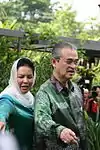
On 20 October 2005, Abdullah Badawi's wife, Endon Mahmood, died of breast cancer. Endon discovered the disease in 2003 while her twin sister Noraini, who had earlier been diagnosed with the same illness, died in January 2003. She received treatment in the United States and returned to Malaysia 18 days before her death. She is buried at a Muslim cemetery, at Taman Selatan, Precinct 20, Putrajaya.
On 6 June 2007, the Prime Minister's office announced Abdullah Badawi's marriage to Jeanne Abdullah. On 9 June, a private ceremony was conducted at the Prime Minister's residence, Seri Perdana, and attended by close relatives. Jeanne was formerly married to the younger brother of Abdullah Badawi's late wife. She was also a manager at the Seri Perdana residential complex and has two children from her previous marriage.[24]
Poetry
Abdullah Ahmad Badawi is known also as a poet. His poem I Seek Eternal Peace was translated into more than 80 languages and published as a book.
Controversies
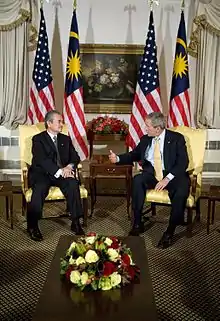
After moves to charge prominent figures such as Eric Chia and the then Land and Co-operative Development Minister, Kasitah Gaddam, with corruption, Abdullah Badawi's administration's efforts to combat corruption allegedly became less transparent. It was noted by the Economist that little progress has been made on curbing corruption.[25]
Brother
Abdullah Ahmad Badawi has been criticised for allowing his brother Fahim Ibrahim Badawi to buy 51 percent of the government-controlled MAS Catering Sdn Bhd. Fahim later sold this stake to Lufthansa's LSG Skychef at a huge profit.Home
Son-in-law
Abdullah Ahmad Badawi has been criticised for allowing his son-in-law, Khairy Jamaluddin, to become unduly influential in UMNO politics.[26]
Secularism
In 2007 Prime Minister Abdullah Ahmad Badawi first called Malaysia an Islamic state. Earlier that month he had made another statement, saying Malaysia was neither a theocratic or secular state.[27] A similar statement was made by Prime Minister on 12 March 2009, where he stated Malaysia was a "negara Islam".[28] The Malaysian Chinese Association (MCA), a political group representing Malaysian Chinese, expressed reservations over this announcement. The MCA's position is that Malaysia is a fully secular state, and that the law transcends religion.[29]
Iraq Oil-for-Food Scandal
Abdullah Ahmad Badawi has been criticised for endorsing his relatives who were involved in abuses related to the Iraqi Oil-for-Food Programme.[30]
Nuclear Proliferation
Abdullah Ahmad Badawi has been criticised after one of his son's companies was found to be producing components for centrifuges purported to be intended for use in Libya's secret uranium enrichment program.
Concerns and disputes by Mahathir Mohamad and UMNO
In 2005, it was alleged that under Abdullah Badawi's administration, there had been a significant increase in cases of cronyism regarding the distribution of import permits for foreign-manufactured vehicles. Then Prime Minister Mahathir had called for an investigation of the issue. Later, Mahathir Mohamad criticised Abdullah for cancelling a number of development projects that the former had started, such as the construction of a bridge to replace the causeway linking Malaysia and Singapore.[31]
Vote of no confidence to Abdullah Badawi in Parliament
On 18 June 2008, the Sabah Progressive Party, a member of the 14-party ruling Barisan Nasional coalition, said its two legislators in the federal parliament will move or back a motion of no-confidence against Abdullah.[32]
Malaysia has never experienced a serious no-confidence vote before and it is unclear what is the next step if, in the unlikely event, Abdullah loses the vote; whether a snap election is held, or whether the King dissolves parliament, or whether a new leader is given the opportunity to form a new government. No Malaysian Prime Minister has ever faced a vote of no-confidence presented by a member of his own coalition before. The Barisan Nasional has 140 lawmakers in the 222-member Parliament, enough to defeat any vote against Abdullah who is also president of the UMNO.
Nevertheless, the motion was rejected by the Speaker on the basis that there were no grounds for the motion to be put forward.
Election result
| Year | Constituency | Votes | Pct | Opponent(s) | Votes | Pct | Ballots cast | Majority | Turnout | |||
|---|---|---|---|---|---|---|---|---|---|---|---|---|
| 1978 | P35 Kepala Batas, Penang | Abdullah Ahmad Badawi (UMNO) | 12,645 | 62.41% | Musa Mohd. Yatim (PAS) | 7,616 | 37.59% | 5,029 | Unknown | |||
| 1982 | Abdullah Ahmad Badawi (UMNO) | 16,759 | 68.51% | Mohamad Sabu (PAS) | 4,115 | 16.82% | 25,277 | 12,644 | 80.29% | |||
| Khoo Siew Hoe (DAP) | 3,589 | 14.67% | ||||||||||
| 1986 | P38 Kepala Batas, Penang | Abdullah Ahmad Badawi (UMNO) | 15,463 | 69.33% | Ahmad Hasan Salahuddin (PAS) | 6,841 | 30.67% | 22,900 | 8,622 | 75.81% | ||
| 1990 | Abdullah Ahmad Badawi (UMNO) | 17,025 | 70.35% | Ahmad Awang (S46) | 7,174 | 29.65% | 24,931 | 9,851 | 80.25% | |||
| 1995 | P41 Kepala Batas, Penang | Abdullah Ahmad Badawi (UMNO) | 22,521 | 82.77% | Naser Mohd Radzi (S46) | 4,687 | 17.23% | 28,301 | 17,834 | 78.39% | ||
| 1999 | Abdullah Ahmad Badawi (UMNO) | 19,985 | 69.40% | Abd Khalid Rasid (PAS) | 8,810 | 30.60% | 29,413 | 11,175 | 81.22% | |||
| 2004 | Abdullah Ahmad Badawi (UMNO) | 25,403 | 77.72% | Abd Khalid Rasid (PAS) | 7,281 | 22.28% | 33,356 | 18,122 | 84.19% | |||
| 2008 | Abdullah Ahmad Badawi (UMNO) | 23,445 | 65.78% | Subri Md Arshad (PAS) | 12,199 | 34.22% | 36,328 | 11,246 | 84.45% | |||
Honours and awards
Honours of Malaysia
 Malaysia :
Malaysia :
_-_SMN.svg.png.webp) Member of the Order of the Defender of the Realm (AMN) (1971)[35]
Member of the Order of the Defender of the Realm (AMN) (1971)[35]_-_SMN.svg.png.webp) Officer of the Order of the Defender of the Realm (KMN) (1975)[36]
Officer of the Order of the Defender of the Realm (KMN) (1975)[36]_-_SMN.svg.png.webp) Grand Commander of the Order of the Defender of the Realm (SMN) - Tun (2009)[37]
Grand Commander of the Order of the Defender of the Realm (SMN) - Tun (2009)[37]
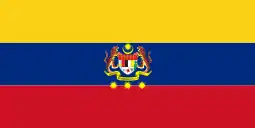 Federal Territory (Malaysia) :
Federal Territory (Malaysia) :
 Grand Knight of the Order of the Territorial Crown (SUMW) - Datuk Seri Utama (2010)
Grand Knight of the Order of the Territorial Crown (SUMW) - Datuk Seri Utama (2010)
 Johor :
Johor :
 Grand Commander of the Royal Family Order of Johor (DKI) (2004)
Grand Commander of the Royal Family Order of Johor (DKI) (2004)
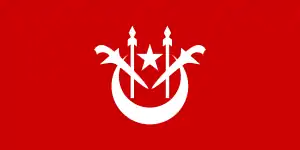 Kelantan :
Kelantan :
 Recipient of the Royal Family Order or Star of Yunus (DK) (2006)[38]
Recipient of the Royal Family Order or Star of Yunus (DK) (2006)[38]
 Kedah :
Kedah :
.svg.png.webp) Kedah Supreme Order of Merit (DUK) (2006)
Kedah Supreme Order of Merit (DUK) (2006)
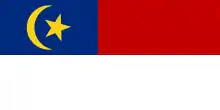 Malacca :
Malacca :
 Knight Grand Commander of the Premier and Exalted Order of Malacca (DUNM) - Datuk Seri Utama (2004)
Knight Grand Commander of the Premier and Exalted Order of Malacca (DUNM) - Datuk Seri Utama (2004)
 Negeri Sembilan :
Negeri Sembilan :
 Principal Grand Knight of the Order of Loyalty to Negeri Sembilan (SPNS) - Dato' Seri Utama (2000)
Principal Grand Knight of the Order of Loyalty to Negeri Sembilan (SPNS) - Dato' Seri Utama (2000)
 Pahang :
Pahang :
 Grand Knight of the Order of Sultan Ahmad Shah of Pahang (SSAP) - Dato' Sri (1999)
Grand Knight of the Order of Sultan Ahmad Shah of Pahang (SSAP) - Dato' Sri (1999) Member 2nd class of the Family Order of the Crown of Indra of Pahang (DK II) (2006)[39]
Member 2nd class of the Family Order of the Crown of Indra of Pahang (DK II) (2006)[39]
.svg.png.webp) Penang :
Penang :
 Member of the Order of Defender of the State (DJN) (1979)
Member of the Order of Defender of the State (DJN) (1979) Companion of the Order of Defender of the State (DMPN) - Dato' (1981)
Companion of the Order of Defender of the State (DMPN) - Dato' (1981) Commander of the Order of Defender of the State (DGPN) - Dato' Seri (1997)
Commander of the Order of Defender of the State (DGPN) - Dato' Seri (1997) Knight Grand Commander of the Order of Defender of the State (DUPN) - Dato' Seri Utama (2004)
Knight Grand Commander of the Order of Defender of the State (DUPN) - Dato' Seri Utama (2004)
 Perak :
Perak :
 Ordinary Class of the Perak Family Order of Sultan Azlan Shah (SPSA) - Dato' Seri DiRaja (2003)
Ordinary Class of the Perak Family Order of Sultan Azlan Shah (SPSA) - Dato' Seri DiRaja (2003)
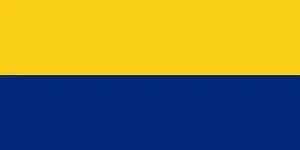 Perlis :
Perlis :
 Knight Grand Companion of the Order of the Gallant Prince Syed Sirajuddin Jamalullail (SSSJ) - Dato' Seri Diraja (2001)
Knight Grand Companion of the Order of the Gallant Prince Syed Sirajuddin Jamalullail (SSSJ) - Dato' Seri Diraja (2001)
 Sabah :
Sabah :
 Grand Commander of the Order of Kinabalu (SPDK) - Datuk Seri Panglima (1999)
Grand Commander of the Order of Kinabalu (SPDK) - Datuk Seri Panglima (1999)
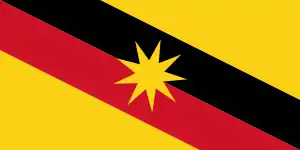 Sarawak :
Sarawak :
_-_1._Knight_Grand_Commander_(DP).svg.png.webp) Knight Grand Commander of the Order of the Star of Hornbill Sarawak (DP) - Datuk Patinggi (2003)
Knight Grand Commander of the Order of the Star of Hornbill Sarawak (DP) - Datuk Patinggi (2003)
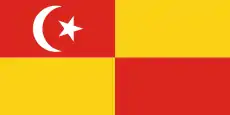 Selangor :
Selangor :
 Knight Grand Companion of the Order of Sultan Salahuddin Abdul Aziz Shah (DSSA) - Dato' (1992)
Knight Grand Companion of the Order of Sultan Salahuddin Abdul Aziz Shah (DSSA) - Dato' (1992) Knight Grand Commander of the Order of the Crown of Selangor (SPMS) - Dato' Seri (2000)
Knight Grand Commander of the Order of the Crown of Selangor (SPMS) - Dato' Seri (2000)
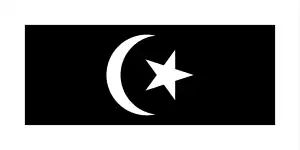 Terengganu :
Terengganu :
 Supreme Class of the Order of Sultan Mizan Zainal Abidin of Terengganu (SUMZ) - Dato' Seri Utama (2005)
Supreme Class of the Order of Sultan Mizan Zainal Abidin of Terengganu (SUMZ) - Dato' Seri Utama (2005)
International Honours
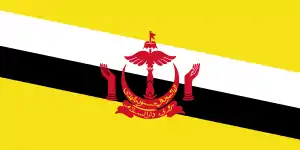 Brunei :
Brunei :
 Family Order of Brunei 1st Class (DK) – Dato Laila Utama (2010)[40]
Family Order of Brunei 1st Class (DK) – Dato Laila Utama (2010)[40]
 Chile :
Chile :
 Grand Cross of the Order of Merit (1994)
Grand Cross of the Order of Merit (1994)
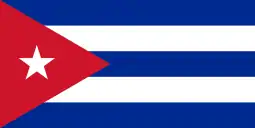 Cuba :
Cuba :
 Order of José Marti (2004)
Order of José Marti (2004)
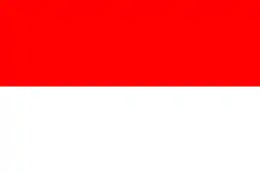 Indonesia :
Indonesia :
 2nd Class of the Star of the Republic of Indonesia (2007)
2nd Class of the Star of the Republic of Indonesia (2007)
 Japan :
Japan :
_1Class_BAR.svg.png.webp) Grand Cordon of the Order of the Sacred Treasure (1991)
Grand Cordon of the Order of the Sacred Treasure (1991)
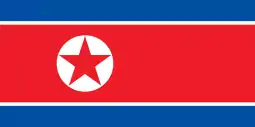 North Korea :
North Korea :
- First Class of the Order of Friendship (1997)
 South Korea :
South Korea :
_Gwanghwa_Medal_ribbon.gif) Gwangha Medal of the Order of Diplomatic Service Merit (1983)
Gwangha Medal of the Order of Diplomatic Service Merit (1983)
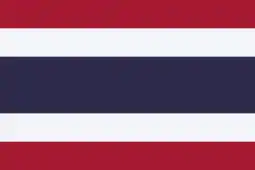 Thailand :
Thailand :
_ribbon.svg.png.webp) Knight Grand Cross of the Order of the White Elephant (GCE) (1994)
Knight Grand Cross of the Order of the White Elephant (GCE) (1994)
Places named after him
Several places were named after him, including:
- Kolej Tun Abdullah Ahmad Badawi, a residential college at Universiti Malaysia Perlis, Simpang Empat, Perlis
References
- "New Malaysian PM sworn in", Al Jazeera. Archived 5 June 2011 at the Wayback Machine.
- "Exit PM Pak Lah, enter Tun Abdullah". Archived 20 July 2011 at the Wayback Machine.
- Noor, Elina, Noor, Ismail. Pak Lah: A Sense of Accountability–An Insight Into Effective Stewardship, Utusan Publications & Distributors, 2003, ISBN 978-967-61-1492-1.
- "Case of three Abdullah Badawi's at launching of Institute", The Star, 13 February 2008. Archived 8 June 2011 at the Wayback Machine.
- "Pak Lah's mother dies at 78". The Star Online. 3 February 2004.
- Backman, Michael. Asia Future Shock: Business Crisis and Opportunity in the Coming Years, Palgrave Macmillan, 2008, ISBN 978-0-230-00677-5, p. 133.
- PM meets relatives from China Archived 15 November 2013 at the Wayback Machine, The Star Online, 22 December 2003.
- "UMNO man and that 'immigrants' remark suspended".
- http://radaris.asia/p/Su/Chiang/
- "Chinese/Native intermarriage in Austronesian Asia".
- "Tun Abdullah Ahmad Badawi: Full Biography". Archived from the original on 12 March 2012. Retrieved 26 July 2012.
- "Badawi administration signs FTA with Japan in 2006". Archived 8 November 2010 at the Wayback Machine.
- "Govt to adopt new economic strategies". Archived 3 June 2011 at the Wayback Machine.
- "BBC NEWS, Malaysia marks 50 years as nation". Archived 3 April 2012 at the Wayback Machine.
- Annie Freeda Cruez and V. Vasudevan."PM gets backing from BN, Umno supreme councils". Archived from the original on 16 May 2008. Retrieved 2008-03-11. , New Straits Times, 11 March 2008.
- "M'sian PM defiant despite fading prospects", AFP AsiaOne News.
- "Malaysian prime minister sworn in for second term". Archived from the original on 13 March 2008. Retrieved 2008-03-13., Associated Press (International Herald Tribune), 10 March 2008.
- "Malaysia PM announces new Cabinet". Archived from the original on 23 March 2008. Retrieved 2008-03-23., CNN, 18 March 2008.
- "Live Telecast of Parliament Malaysia". 30 April 2008. Archived from the original on 16 March 2013. Retrieved 2011-02-15. .
- "Dr M quits Umno". The Star Online. Retrieved 28 August 2018.
- "Law Minister Zaid 'tenders resignation'". Malaysiakini. 15 September 2008. Retrieved 28 August 2018.
- Najib sworn in, Tunship for Abdullah and wife, 2009/04/03, New Straits Times Online Archived 19 August 2018 at the Wayback Machine
- "Abdullah's boon to Kepala Batas folk". The Star (Malaysia). 2 April 2009. Archived from the original on 3 April 2009. Retrieved 8 February 2016.
- "Prime Minister To Wed Jeanne Abdullah Badawi Saturday". Bernama. 6 June 2007. Archived from the original on 14 July 2007.
- Malaysia | Cleaning up? Economist.com
- Goh, Melissa (18 November 2006). Khairy says he does not influence government decisions. Channel News Asia. Archived 4 November 2007 at the Wayback Machine
- http://www.wluml.org/node/4006
- http://www.thenutgraph.com/mca-malaysia-is-a-secular-state/
- http://www.thenutgraph.com/mca-malaysia-is-a-secular-state/
- Asia Times Archived 22 June 2011 at the Wayback Machine
- The velvet gloves come off Malaysia Today Archived 16 December 2007 at the Wayback Machine
- "SAPP's vote of no confidence against PM". The Star Online. Retrieved 28 August 2018.
- "Keputusan Pilihan Raya Umum Parlimen/Dewan Undangan Negeri" (in Malay). Election Commission of Malaysia. Retrieved 4 February 2017. Percentage figures based on total turnout.
- "Malaysia General Election". undiinfo Malaysian Election Data. Malaysiakini. Retrieved 4 February 2017. Results only available from the 2004 election.
- "Semakan Penerima Darjah Kebesaran, Bintang dan Pingat Persekutuan".
- "Semakan Penerima Darjah Kebesaran, Bintang dan Pingat Persekutuan".
- "Semakan Penerima Darjah Kebesaran, Bintang dan Pingat Persekutuan".
- "Semakan Penerima Darjah Kebesaran, Bintang dan Pingat Persekutuan".
- "Abdullah heads awards list". The Star. 24 October 2006. Retrieved 12 November 2019.
- "Former Malaysian PM leaves Brunei". Ministry of Foreign Affairs (Malaysia). Retrieved 23 December 2019.
Further reading
- Bridget Welsh & James Chin (ed) Awakenings: The Abdullah Badawi Years in Malaysia (KL: SIRD 2013)
External links
| Wikiquote has quotations related to: Abdullah Ahmad Badawi |
| Wikimedia Commons has media related to Abdullah Badawi. |
- Official Website of the Government of Malaysia
- Profile: Abdullah Ahmad Badawi, BBC News, 8 October 2008
- The loyal Abdullah wins his rival Anwar's job
- thesundaily.com, Full statement from PM Abdullah Ahmad Badawi
- Video of discussion with Abdullah Ahmad Badawi at the Asia Society, New York 10/19/2009
- "Abdullah Ahmad Badawi collected news and commentary". The New York Times.
